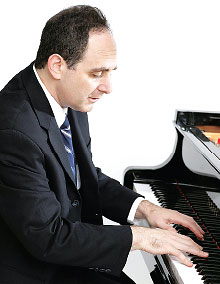Richard Kogan, M.D., to Put Words to Music at Menninger Convocation Lecture
Abstract
Psychiatrist and award-winning pianist Richard Kogan, M.D., will discuss Tchaikovsky’s music and melancholy.

Annual Meeting favorite Richard Kogan, M.D., will discuss how the stigma of homosexuality contributed heavily to Tchaikovsky’s depression.
Many people are likely familiar with the music of Pyotr Ilyich Tchaikovsky, especially around the holidays when selections of “The Nutcracker” fill the airwaves. Yet few know of the turbulent emotional life of the composer behind iconic songs like the “Waltz of the Flowers” or the bombastic “1812 Overture,” said Richard Kogan, M.D., a clinical professor of psychiatry at Weill Cornell Medical College, artistic director of the Weill Cornell Music and Medicine Program, and co-director of the Weill Cornell Human Sexuality Program.
Attendees at APA’s 2020 Annual Meeting in Philadelphia can learn more about one of the 19th century’s greatest composers and hear samples of his music at the Convocation of Distinguished Fellows, where Kogan will deliver the 2020 William C. Menninger Memorial Convocation Lecture.
His lecture, titled “Tchaikovsky: Music and Melancholy,” is part of a long series of lectures that Kogan has presented at APA’s Annual Meeting on the connections between musical artistry and mental illness. The lectures are accompanied by piano performances by Kogan, who is an award-winning pianist.
“Tchaikovsky’s music is the indelible outgrowth of his mental state,” Kogan told Psychiatric News. “His glorious ballets, for example, reflect an idealized fantasy world where he could escape his real-world despondency.”
According to Kogan, juxtaposing Tchaikovsky’s glorious music with an exploration of his struggles helps illustrate the need to destigmatize mental illness. “It seems perverse to stigmatize a group that includes individuals like Tchaikovsky who have made such an immense contribution to civilization,” he said.
In Tchaikovsky’s case, stigma also applied to his sexual orientation. “He was a gay man living in Russia at a time when such behavior was punished by banishment to Siberia. He was terrified of the implications and did everything to hide the truth. He even had a brief and ultimately disastrous marriage, which compounded his personal strife.”
Those emotional troubles might have even led to Tchaikovsky’s death in 1893. Though his death was attributed to cholera, many historians suspect it might have been suicide.
His only escape was music. Tchaikovsky once wrote in a letter that “without music, I would go insane.” That letter was one of thousands written by Tchaikovsky, who also kept extensive diaries. His most extensive correspondence was with wealthy widow Nadezhda von Meck, who offered to be his patron on the condition they never meet in person, a condition Kogan said is unique in the annals of artistic patronage. The pair, however, did exchange more than 1,200 letters over 14 years, which provided tremendous insight into Tchaikovsky’s psyche.
“For years, I had heard that Dr. Kogan’s session should not be missed,” said APA CEO and Medical Director Saul Levin, M.D., M.P.A., “but I would miss it due to a ‘lecture I had to hear.’ After becoming the CEO and medical director, I bumped into him and told him I wish I could hear his lecture and recital. Alas, my duties always kept me away. I finally had the chance to hear his presentation on Shubert at another organization’s meeting, and I now make it a priority to attend these remarkable sessions. This year is a special year as Dr. Kogan rarely performs Tchaikovsky, so it is fortunate it will be the Convocation presentation.”
Though unplanned on Kogan’s part, the location of Philadelphia is also symbolic in Tchaikovsky’s life. In spring 1891, Tchaikovsky traveled to the United States for a brief tour of several East Coast cities. The tour may be most remembered for Tchaikovsky’s providing the first-ever performance at the just-opened Carnegie Hall in New York; it concluded on May 18 at the Philadelphia Academy of Arts—the last time Tchaikovsky performed in the United States. ■
The Convocation will be held on Monday, April 27, in Hall B, 200 Level, Pennsylvania Convention Center from 4:30 p.m. to 6:45 p.m.



